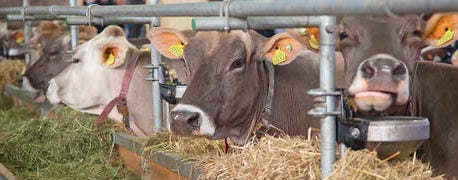October 5, 2012

A group of dairy farmers attending the World Dairy Expo last week spoke out opposing the Dairy Market Stabilization provision in the 2012 Farm Bill, also known as "Supply Management."
The highly debated provision in the Dairy Security Act allows the government to periodically impose limits on milk production to spur price recovery, and could penalize farmers that do not comply.
Though the National Milk Producers Federation supports the measure, the International Dairy Foods Association strongly opposes it.
IDFA says the proposed legislation would "raise consumer prices, hurt exports, cost thousands of new jobs and stifle investments in new facilities."

The Dairy Market Stabilization Program in the 2012 Farm Bill continues to stir debate among dairy industry stakeholders
At the World Dairy Expo, however, those speaking out against DMSP were most concerned about reducing production.
"That deduction, at 8% or even at 4%, has a huge impact on our bottom line," said John Pagel, a Wisconsin dairyman. "That 8% can pay a lot of bills or cover my interest at the bank."
Pagel joined other dairy farmers, including LuAnn Troxel, who with her husband milks 130 cows in Indiana, in speaking out against DMSP.
"My opposition to supply management stems from a fundamental belief in our free market system, as I think farmers should have the ability to make their own choices," Troxel said, "and I have a personal desire to have optimal expansion options to accommodate our sons' desires to join our dairy operation."
Gordon Speirs, a 3rd generation dairyman, moved his operation from Canada to Wisconsin in 2003. The farm is a 1,500 cow dairy and is in the process of expanding to 2,100 cows over the next two years.
"I am opposed to supply management because once regulations are in place and found to be not working, the government will do their best to try to fix it with more regulations," said Speirs. "This was my experience in Canada with the quota system and I expect it will not be different here."
Jerry Meissner, president of the Board of Directors for the Wisconsin Dairy Business Association, and owner of a 2,000-cow operation in Wisconsin, said the program was "bad news" for Wisconsin.
"Dairy farmers in Wisconsin could have been penalized up to $18,000 had this program been in effect now," he said.
~~~PAGE_BREAK_HERE~~~
An amendment proposed by Reps. Bob Goodlatte, R-Va., and David Scott, D-Ga., would remove the stabilization provision, and also would provide dairy farmers with the ability to obtain margin insurance, with catastrophic coverage, as a risk management tool for times of low milk prices, according to the Wisconsin Dairy Business Association.
Though the amendment was voted down 29-17 in House Agriculture Committee discussion of the Farm Bill, the amendment is expected to be offered and voted upon when the full House considers the Farm Bill.
The group says Goodlatte-Scott provides the same catastrophic coverage at no cost to more than 90% of all U.S. dairy farms, but wouldn't require dairy producers to reduce their milk production or else see deductions in their milk checks.
New York dairyman Jeff Mulligan was most concerned about this aspect of the proposed legislation.
"What I do know is this," he said, "I do not want the government to tell me how much milk I should be producing, and certainly do not want them to penalize me if I do not comply."
Additional organizations opposed to DMSP include:
California Dairies, Inc., Dairy Business Milk Marketing Cooperative, Dairy Policy Action Coalition, National All-Jersey, Inc., North East Dairy Producers Association, Inc. , Wisconsin Dairy Business Association, Minnesota Milk Producers, Alliance Dairies (Florida), Board of Directors of Bongards' Creameries (Minnesota), First District Association (Minnesota) and High Desert Milk (Idaho).
As 2008 Farm Bill expired in September, many farm groups and even U.S. Agriculture Secretary Tom Vilsack have singled dairy farmers out as one of the most affected groups. Addressing a crowd of dairy farmers earlier in the week also at WDE, Vilsack said there will be repercussions if Congress doesn't pass a Farm Bill before 2013 – including reverting to 1949 policy.
"Under the 1949 Farm Bill, milk prices would climb to between $38 and $50 per hundredweight. That may sound good, but it will have a rippling effect and will impact consumer choices. Companies will reformulate their products without dairy or will use less dairy and consumers will buy less dairy. So, really, dairy farmers do not want that to happen," he said.
He supports the passage of a 2012 Farm Bill, which may be voted on by the House during the lame duck session.
You May Also Like




